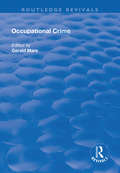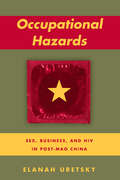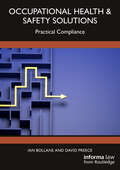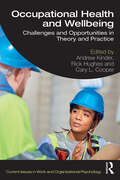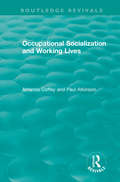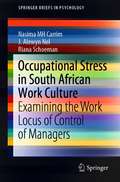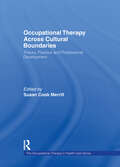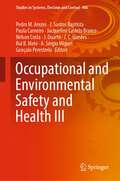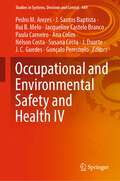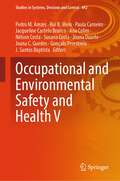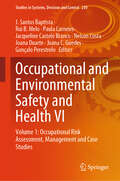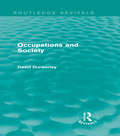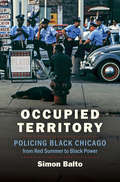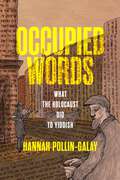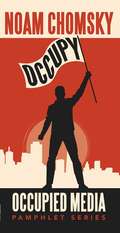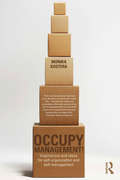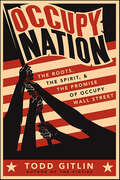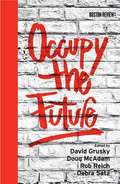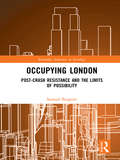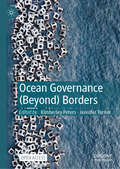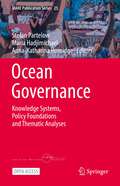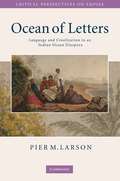- Table View
- List View
Occupation Diaries
by Raja ShehadehIt is often the smallest details of daily life that tell us the most. And so it is under occupation in Palestine. What most of us take for granted has to be carefully thought about and planned for: When will the post be allowed to get through? Will there be enough water for the bath tonight? How shall I get rid of the rubbish collecting outside? How much time should I allow for the journey to visit my cousin, going through checkpoints? And big questions too: Is working with left-wing Israelis collaborating or not? What affect will the Arab Spring have on the future of Palestine? What can anyone do to bring about change? Are any of life's pleasures untouched by politics?
Occupational Biomechanics
by Gunnar Andersson Don Chaffin Bernard MartinWith critical applications in manufacturing, transportation, defense, security, environmental safety and occupational health, and other industries, the field of occupational biomechanics is more central to industrial design than ever before. This latest edition of the popular and widely adopted Occupational Biomechanics provides the foundations and tools to assemble and evaluate biomechanical processes as they apply to today's changing industries, with emphasis on improving overall work efficiency and preventing work-related injuries. The book expertly weaves engineering and medical information from diverse sources and provides a coherent treatment of the biomechanical principles underlying the well-designed and ergonomically sound workplace.
Occupational Crime
by Gerald MarsThis title was first publishde in 2001. Occupational crime is found in the whole range of occupations and at all levels. Despite the fact that activities are widespread and well known, the area is blurred by contradictory perceptions, denials and arguments over definition. This volume presents influential essays on the topic.
Occupational Hazards
by Elanah UretskyDoing business in China can be hazardous to your health. Occupational Hazards follows a group of Chinese businessmen and government officials as they conduct business in Beijing and western Yunnan Province, exposing webs of informal networks that help businessmen access political favors. These networks are built over liquor, cigarettes, food, and sex, turning risky behaviors into occupational hazards. Elanah Uretsky's ethnography follows these powerful men and their vulnerabilities to China's burgeoning epidemics of sexually transmitted infections (STIs) and HIV/AIDS. Examining the relationship between elite masculine networking practices and vulnerability to HIV infection, Occupational Hazards includes the stories of countless government officials and businessmen who regularly visit commercial sex workers but resist HIV testing for fear of threatening their economic and political status. Their fate is further complicated by a political system that cannot publicly acknowledge such risk and by authoritative international paradigms that limit the reach of public health interventions. Ultimately, Uretsky offers insights into how complex socio-cultural and politico-economic negotiations affect the development and administration of China's HIV epidemic.
Occupational Health & Safety Solutions: Practical Compliance
by David Preece Ian BollansHealth and safety legislation places significant responsibilities on employers and managers to protect the health and safety of their workers, but the subject area is seen as both complex and technical in nature, often requiring the input of professionals. This book dispels these myths by taking a unique approach, allowing somebody with little or no knowledge of the subject to understand their legal duties and then take a practical step-by-step approach to control workplace risks and prevent accidents.Occupational Health & Safety Solutions: Practical Compliance is a reworking and updating of Jordan Publishing’s Health and Safety Management, published by LexisNexis from 1997 to 2023. The book takes a comprehensive approach by covering the main subject areas of occupational health and safety and is relevant to all types of workplaces. It provides enough background knowledge for the reader to understand what the law requires, and what needs to be done to achieve compliance, with the main emphasis being on practical application. Providing the reader with the ability to manage health and safety through a process of flowcharts, diagrams, and extensive checklists, the book draws on the expertise of the authors and current best practice within industry. Each chapter sets out a clear, practical approach to identifying and managing risks, thereby enabling a robust and successful health and safety management system to be established in any workplace.The book is written for non-safety professionals such as managers and directors who want to discharge and manage their health and safety responsibilities in their workplace without the need to engage a consultant. It will also appeal to the safety professional by providing an authoritative guide to current best practice together with the practicalities of managing health and safety risks.
Occupational Health and Wellbeing: Challenges and Opportunities in Theory and Practice (Current Issues In Work And Organizational Psychology Ser.)
by Cary Cooper Rick Hughes Andrew KinderThis book bridges the gap between theory and practice, incorporating real-world case studies to show how organisations and leaders can adapt after the global unrest and uncertainty caused by the COVID-19 pandemic and more recent challenges. Drawing from expert opinions across the world to highlight the current challenges and opportunities within this sector, it explores how these ideas can be effectively applied within the workplace. The book covers a wealth of topical and relevant themes that include defining wellbeing in a modern world, toxic leadership, mental health first aid, the application of positive psychology, and what the ‘new normal’ might look like. Together, these contributions offer a rich look into how Occupational Health and Wellbeing practices have developed, struggled and thrived. The COVID-19 pandemic forced many organisations to adapt fast and became the most significant accelerator in recent times for embracing, enhancing and improving employee health and wellbeing. Understanding this, the book demonstrates how Occupational Health and Wellbeing continues to rise on the corporate agenda as a key contributor to employee satisfaction, engagement and retention, increased financial stability and overall organisational success. The book is essential reading for senior executives, leaders and professionals involved in occupational health, human resources, health, safety and wellbeing, people support, people development, employee assistance, counselling as well as students within organisational and occupational psychology.
Occupational Socialization and Working Lives (Routledge Revivals)
by Amanda Coffey Paul AtkinsonPublished in 1994, this book gathers together a series of original studies on occupational socialization and the everyday realities of work. It includes detailed, empirically based accounts of a variety of occupational settings. Included are: social workers; trainee midwives; prison officers; accountants; teachers; psychiatrists; postgraduate research students. They all reflect the tradition of qualitative research that has been developed at Cardiff. This book was originally published as part of the Cardiff Papers in Qualitative Research series edited by Paul Atkinson, Sara Delamont and Amanda Coffey. The series publishes original sociological research that reflects the tradition of qualitative and ethnographic inquiry developed at Cardiff. The series includes monographs reporting on empirical research, edited collections focussing on particular themes, and texts discussing methodological developments and issues.
Occupational Stress in South African Work Culture: Examining the Work Locus of Control of Managers (SpringerBriefs in Psychology)
by Nasima MH Carrim J. Alewyn Nel Riana SchoemanThis book explores avenues for organisations to better understand the origins of occupational stress so as to enable their managerial employees to effectively manage stress levels. By way of the work locus of control as a personality variable, the book identifies stressors both within and outside the organisation that underpin high stress levels in organisational culture. In grappling with what is required in the new workforce of ‘Generation Y’ millennials in a hyper-networked and mobile age, the authors present examples from everyday professional situations in South Africa to contribute to critical understanding of today’s working world. By applying neuroscientific principles developed from a foundation of empirical research, the authors introduce the concepts of a 'red zone’ and ‘blue zone' to explain differences between the brain areas controlled either by its stem-limbic areas, or the limbic-cortical cortex areas, respectively. This becomes a psychological shorthand for describing and applying knowledge to encourage practitioners in leadership and management roles to achieve desired behaviour outcomes, and to establish a framework for understanding employee values and worldviews. The book is relevant to practitioners, postgraduate students and researchers interested in industrial psychology, personality psychology, business management and human resources.
Occupational Therapy Across Cultural Boundaries: Theory, Practice and Professional Development
by Susan Cook MerrillThis fascinating book examines the concept of culture from a unique perspective--that of individual occupational therapists who have worked in environments very different from those in which they were educated or had worked previously. In Occupational Therapy Across Cultural Boundaries, six occupational therapists relate their experiences living and working in a foreign culture. Each author describes the daily demands placed upon her through immersion into a different way of life and discusses the environmental challenges she had to overcome to be able to live and work successfully. Many of the cultural differences the authors faced forced them to reassess and reconstruct their most basic assumptions of both personal and professional life as they discovered that activities and theories common or applicable in one culture are not necessarily translatable into another. The authors also analyze culture across treatment areas in occupational therapy practice, including mental health and physical disability, with both adults and children.Both beginning and experienced occupational therapists and occupational therapy students will find much valuable information in Occupational Therapy Across Cultural Boundaries. Whether interested in examining occupational therapy’s application to non-Western cultures, or actually contemplating practicing in a different culture, readers will benefit from learning about the experiences of the authors. This unique book is also helpful for occupational therapy students wishing to examine the philosophy of occupational therapy or the significance of culture to human occupation. Professors will find it useful as an ancillary textbook for undergraduate and graduate courses in occupational therapy on topics such as theory, occupation across cultures, or meaningful activity.
Occupational and Environmental Safety and Health III (Studies in Systems, Decision and Control #406)
by Pedro M. Arezes Paula Carneiro Rui B. Melo Gonçalo Perestrelo Nélson Costa A. Sérgio Miguel J. Duarte J. Santos Baptista Jacqueline Castelo Branco J. C. GuedesThis book gathers cutting-edge research and best practices relating to occupational risk and safety management, healthcare and ergonomics. It covers strategies for different types of industry, such as construction, food, chemical and healthcare. It gives a special emphasis on challenges posed by automation, discussing solutions offered by technologies, and reporting on case studies carried out in different countries. Chapters are based on selected contributions to the 17th International Symposium on Occupational Safety and Hygiene (SHO 2021), held virtually on November 17–19, 2021, from Portugal. By reporting on different perspectives, such as the ones from managers, workers and OSH professionals, and covering timely issues, such as safety evaluation of human-robot collaboration, this book offers extensive information and a source of inspiration to OSH researchers, practitioners and organizations operating in both local and global contexts.
Occupational and Environmental Safety and Health IV (Studies in Systems, Decision and Control #449)
by Pedro M. Arezes Paula Carneiro Rui B. Melo Gonçalo Perestrelo Nélson Costa J. Duarte J. Santos Baptista Jacqueline Castelo Branco J. C. Guedes Ana Colim Susana CostaThis book gathers cutting-edge research and best practices relating to occupational risk and safety management, healthcare and ergonomics. It covers strategies for different industries, such as construction, chemical and healthcare. It emphasises challenges posed by automation, discusses solutions offered by technologies, and reports on case studies carried out in different countries. Chapters are based on selected contributions to the 18th International Symposium on Occupational Safety and Hygiene (SHO 2022), held on September 8–9, 2022, in Porto, Portugal. By reporting on different perspectives, such as the ones from managers, workers and OSH professionals, and covering timely issues, such as implications of telework ,issues related to gender inequality and applications of machine learning techniques in occupational health, this book offers extensive information and a source of inspiration to OSH researchers, practitioners and organizations operating in both local and global contexts.
Occupational and Environmental Safety and Health V (Studies in Systems, Decision and Control #492)
by Pedro M. Arezes Paula Carneiro Rui B. Melo Gonçalo Perestrelo Nélson Costa J. Santos Baptista Joana Duarte Jacqueline Castelo Branco Ana Colim Susana Costa Joana C. GuedesThis book gathers cutting-edge research and best practices relating to occupational risk and safety management, healthcare, and ergonomics. It covers strategies for different industries, such as construction, chemical and healthcare. It emphasizes challenges posed by automation, discusses solutions offered by technologies, and reports on case studies carried out in different countries. Chapters are based on selected contributions to the 20th International Symposium on Occupational Safety and Hygiene (SHO 2023), held on July 20-21, 2023, in Portugal, as a hybrid event. By reporting on different perspectives, such as the ones from managers, employees, and OSH professionals, and covering timely issues, such as implications of telework, issues related to gender inequality and applications of machine learning techniques in occupational health, this book offers extensive information and a source of inspiration to OSH researchers, practitioners and organizations operating in both local and global contexts.
Occupational and Environmental Safety and Health VI: Volume 1: Occupational Risk Assessment, Management and Case Studies (Studies in Systems, Decision and Control #230)
by Paula Carneiro Nelson Costa Rui B. Melo Gonçalo Perestrelo J. Santos Baptista Joana Duarte Jacqueline Castelo Branco Joana C. GuedesThis book gathers cutting-edge research and best practices relating to occupational risk and safety management, healthcare, and ergonomics. It covers strategies for different industries, such as construction, chemical, and healthcare. It emphasizes challenges posed by automation, discusses solutions offered by technologies, and reports on case studies carried out in different countries. Chapters are based on selected contributions to the 21st International Symposium on Occupational Safety and Hygiene (SHO 2024), held on July 4-5, 2024, in Porto, Portugal. By reporting on different perspectives, such as the ones from managers, employees, and OSH professionals, and covering timely issues, such as implications of telework, issues related to gender inequality and applications of machine learning techniques in occupational health, this book offers extensive information and a source of inspiration to OSH researchers, practitioners, and organizations operating in both local and global contexts. This is the first volume of a 2-volume set.
Occupations and Society (Routledge Revivals)
by David DunkerleyWork and the nature of occupations are matters of central concern to the sociologist. In this basic introduction to the sociology of professions, occupations and work, first published in 1975, David Dunkerley provides a theoretical basis for the study of a subject that previously had a strong empirical tradition. Drawing on comparative literature, the author analyses the structure of occupation, the processes of occupational life and how occupations are related to the predominant culture. The effects of occupations on the non-work lives of individuals are also examined, and extended examples are given of managerial and scientific occupations as case studies.
Occupied Territory: Policing Black Chicago from Red Summer to Black Power (Justice, Power, and Politics)
by Simon BaltoIn July 1919, an explosive race riot forever changed Chicago. For years, black southerners had been leaving the South as part of the Great Migration. Their arrival in Chicago drew the ire and scorn of many local whites, including members of the city's political leadership and police department, who generally sympathized with white Chicagoans and viewed black migrants as a problem population. During Chicago's Red Summer riot, patterns of extraordinary brutality, negligence, and discriminatory policing emerged to shocking effect. Those patterns shifted in subsequent decades, but the overall realities of a racially discriminatory police system persisted.In this history of Chicago from 1919 to the rise and fall of Black Power in the 1960s and 1970s, Simon Balto narrates the evolution of racially repressive policing in black neighborhoods as well as how black citizen-activists challenged that repression. Balto demonstrates that punitive practices by and inadequate protection from the police were central to black Chicagoans' lives long before the late-century "wars" on crime and drugs. By exploring the deeper origins of this toxic system, Balto reveals how modern mass incarceration, built upon racialized police practices, emerged as a fully formed machine of profoundly antiblack subjugation.
Occupied Words: What the Holocaust Did to Yiddish (Jewish Culture and Contexts)
by Hannah Pollin-GalayHow Yiddish changed to express and memorialize the trauma of the HolocaustThe Holocaust radically altered the way many East European Jews spoke Yiddish. Finding prewar language incapable of describing the imprisonment, death, and dehumanization of the Shoah, prisoners added or reinvented thousands of Yiddish words and phrases to describe their new reality. These crass, witty, and sometimes beautiful Yiddish words – Khurbn Yiddish, or “Yiddish of the Holocaust” – puzzled and intrigued the East European Jews who were experiencing the metamorphosis of their own tongue in real time. Sensing that Khurbn Yiddish words harbored profound truths about what Jews endured during the Holocaust, some Yiddish speakers threw themselves into compiling dictionaries and glossaries to document and analyze these new words. Others incorporated Khurbn Yiddish into their poetry and prose. In Occupied Words, Hannah Pollin-Galay explores Khurbn Yiddish as a form of Holocaust memory and as a testament to the sensation of speech under genocidal conditions. Occupied Words investigates Khurbn Yiddish through the lenses of cultural history, philology, and literary interpretation. Analyzing fragments of language consciousness left behind from the camps and ghettos alongside the postwar journeys of three intellectuals—Nachman Blumental, Israel Kaplan and Elye Spivak—Pollin-Galay seeks to understand why people chose Yiddish lexicography as a means of witnessing the Holocaust. She then turns to the Khurbn Yiddish words themselves, focusing on terms related to theft, the German-Yiddish encounter and the erotic female body. Here, the author unearths new perspectives on how Jews experienced daily life under Nazi occupation, while raising questions about language and victimhood. Lastly, the book explores how writers turned ghetto and camp slang into art—highlighting the poetry and fiction of K. Tzetnik (Yehiel Di-Nur) and Chava Rosenfarb. Ultimately, Occupied Words speaks to broader debates about cultural genocide, asking how we might rethink the concept of genocide through the framework of language.
Occupy
by Noam ChomskyNoam Chomsky discusses the Occupy movement, democracy, class war, the economy and the prospects for long term social change in light of global threats like climate change and nuclear proliferation. Chomsky praises the efforts of Occupy Wall Street and advocates education, workplace democracy, organizing and community outreach to develop the mass base of popular support needed to restore and sustain genuine people-powered democracy.
Occupy Management: Inspirations and Ideas for Self-Organization and Self-Management
by Monika KosteraIt can be said that our times are characterized both by the omnipresence of organizations and by the destabilization of organized social life, caused by the erosion of its structural and moral foundations such as long-term employment, social trust or an actual observance of the proclaimed codes of ethics. At the same time there is a huge and growing potential for organized change due to the amount of students and graduates of different types of management studies and programmes all over the world. The role of the state may become atrophied and corporations seem all too eager to seize ever more power while renouncing responsibility towards the environment and the employees, but a huge and unprecedented number of people from all walks of life, all social classes and all countries now have the qualifications to take over the responsibility for social organizations. The objective of Occupy Management: Inspirations and Ideas for Self-Organization and Self-Management is to make it evident to the student why and how he or she can manage without becoming part of corporate power structures. Aimed at postgraduate students studying organizational and management theory as well as social entrepreneurship, this book is not a simple repetition of essential knowledge in these areas, but a re-direction of such knowledge towards self-management and self-organization.
Occupy Nation: The Roots, the Spirit, and the Promise of Occupy Wall Street
by Todd Gitlin“[A] much needed book…a compelling portrait of the Occupy movement…that capture[s] the spirit of the people involved, the crisis that gave Occupy birth, and the possibility of genuine change it represents.”—Eric Foner, author of The Fiery Trial: Abraham Lincoln and American SlaveryThe Occupy Wall Street movement arose out of a widespread desire of ordinary Americans to change a political system in which the moneyed “1%” of the nation controls the workings of the government. In Occupy Nation, social historian Todd Gitlin—a former leader of the Students for a Democratic Society (SDS) who stood at the forefront of the birth of the New Left and the student protests of the 1960s and ’70s—offers a unique overview of one of the most rapidly growing yet misunderstood social revolutions in modern history. Occupy Nation is a concise and incisive look at the Occupy movement at its pivotal moment, as it weighs its unexpected power and grapples with its future mission.
Occupy the Future
by Doug Mcadam David Grusky Rob Reich Debra SatzThe Occupy Wall Street movement has ignited new questions about the relationship between democracy and equality in the United States. Are we also entering a moment in history in which the disjuncture between our principles and our institutions is cast into especially sharp relief? Do new developments--most notably the rise of extreme inequality--offer new threats to the realization of our most cherished principles? Can we build an open, democratic, and successful movement to realize our ideals? Occupy the Future offers informed and opinionated essays that address these questions. The writers--including Nobel Laureate in Economics Kenneth Arrow and bestselling authors Paul and Anne Ehrlich--lay out what our country's principles are, whether we're living up to them, and what can be done to bring our institutions into better alignment with them.
Occupying London: Post-Crash Resistance and the Limits of Possibility (Routledge Advances in Sociology)
by Samuel BurgumJust because there has been a crisis does not necessarily mean there is going to be a change. And yet why, exactly, did nothing change in the face of global resistances and movements which followed the financial meltdown of 2007/8? Based on ethnographic research with the Occupy movement in London – as a case study of one post-crash attempt to bring alternatives about – this book argues that change was ultimately foreclosed by widespread ‘common sense’ limitations of what was considered possible after the crash. Offering a critically constructive analysis of the Occupy movement in London and incorporating both activist praise and self-criticism of their movement, Occupying London discusses both the political potential suggested by the occupation of space and the slogan ‘we are the 99%’, as well as the problematic extension of post-crash normativity into the movement through issues of organisation, repetitions of wider norms, and an inadvertent acceptance of wider distributions of possibility. Such positives and negatives are shown to have played out in a wide-range of arenas: from the occupation of space itself, through attempts to organise collective appearance and voice, as well as ‘authentic’ constructions of resistance and ‘cynical’ framings of power. The author’s intention is to provoke thought on behalf of any ‘half-fascinated, half-devastated witnesses’ of the financial crash and the political disappointments which followed. It is argued that such movements possess the potential to bring about progressive change, but only if they intervene into wider distributions of ‘common sense’ by embracing collective symbolic efficiency and avoiding binary framings of ‘authentic’ resistance vs. ‘hidden’ power.
Occupying Syria under the French Mandate
by Daniel NeepWhat role does military force play during a colonial occupation? The answer seems obvious: coercion crushes local resistance, quashes political dissent, and consolidates the dominance of the occupying power. However, as this discerning and theoretically rigorous study suggests, violence can have much more ambiguous consequences. Set in Syria during the French Mandate from 1920 to 1946, the book explores a turbulent period in which conflict between armed Syrian insurgents and French military forces not only determined the strategic objectives of the colonial state, but also transformed how the colonial state organised, controlled, and understood Syrian society, geography, and population. In addition to the coercive techniques of airpower, collective punishment, and colonial policing, the book shows how civilian technologies such as urban planning and engineering were also commandeered in the effort to undermine rebel advances. In this way, colonial violence had a lasting effect in Syria, shaping a peculiar form of social order that endured well after the French occupation. As the conclusion surmises, the interplay between violence, spatial colonisation, and pacification continues to resonate with recent developments in the region.
Ocean Governance (Beyond) Borders
by Jennifer Turner Kimberley PetersThis Open Access book “Ocean Governance (Beyond) Borders” is concerned with the persistence of bordering in ocean space, and the possibilities that might arise if we think beyond borders for modes of oceanic management, engaging the ocean’s fluid physicality and the mobile human and more-than-human life entangled with it. At a moment where ocean governance is a pressing topic amongst academics, policy makers, governments and non- governmental agencies alike, this book takes on one of the most overlooked but central devices underscoring many modes of oceanic management: the border. Uniquely combining contemporary border scholarship with cutting edge ocean governance research this book tackles themes ranging from biodiversity conservation and asylum regulations to shipping management measures, tourism, and the growing blue economy. This edited volume hence explores varied bordering practices, whilst also addressing the ‘common-senseness’ with which bordering is deployed at sea, questioning – and problematising – its function and efficacy. Throughout 12 carefully curated chapters, authors ask: What borders are present in the seas and oceans, where and why? In doing this the book offers readers a simple provocation: Do we need borders? And can we govern differently?
Ocean Governance: Knowledge Systems, Policy Foundations and Thematic Analyses (MARE Publication Series #25)
by Anna-Katharina Hornidge Maria Hadjimichael Stefan PartelowThis Open Access book on Ocean Governance examines sustainability challenges facing our oceans today. The book is organized into three sections: knowledge systems, policy foundations and thematic analyses. The knowledge produced in the book was catalyzed by the scientific outcomes within the European-funded Cooperation in Science and Technology (COST) network “Ocean Governance for Sustainability – Challenges, Options and the Role of Science”. This network brings together scientists, policy-makers and civil society representatives from 28 nation states to cooperate on ocean governance research. This book offers a compilation of new research material including focused case studies, broad policy syntheses and reflective chapters on the history and current status of knowledge production systems on ocean governance. New research material is presented, although some chapters draw on secondary sources. The book starts with synthetic review chapters from the editors, outlining past and present knowledge systems, addressing how and why ocean governance for sustainability is where it currently stands with critical reflections on existing narratives, path dependencies and colonialist histories. This is followed by chapters addressing, synthesizing and analyzing different legal and policy frameworks for ocean governance both regionally and internationally. At the core of the book are the thematic analyses, which provide focused case studies with detailed contextual information in support of different ocean governance challenges and sustainability pathways around the world. The book concludes with a chapter explicitly targeting students, researchers and policy-makers with key take-away messages compiled by the editors.
Ocean Of Letters: Language And Creolization In An Indian Ocean Diaspora (Critical Perspectives On Empire)
by Pier M. LarsonOcean of Letters is a remarkable history of imperialism, language, and creolization in the largest African diaspora of the Indian Ocean in the early modern period. Ranging from Madagascar to the Mascarenes, the Comores, and South Africa, Pier M. Larson sheds new light on the roles of slavery, emancipation, oceanic travel, Christian missions, and colonial linguistics in the making of Malagasy-language literacy in the islands of the western Indian Ocean. He shows how enslaved and free Malagasy together with certain European colonists and missionaries promoted the Malagasy language, literacy projects and letter writing in the multilingual colonial societies of the region between the seventeenth and mid-nineteenth centuries. Addressing current debates in the history of Africa and the African diaspora, slavery, abolition, creolization and the making of modern African literatures, the book crosses thematic as well as geo-imperial boundaries and brings fresh perspectives to Indian Ocean history.


